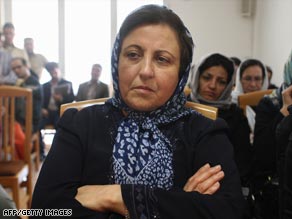Story Highlights
- Nobel Peace Prize winner Shirin Ebadi's office raided by Iranian authorities Monday
- Protesters attack her office, home in Tehran Thursday, accuse her of backing Israel
- Ebadi, a veteran human rights activist, won the Nobel Peace Prize in 2003
- Fellow rights activists, Nobel prize winners have expressed fears for her safety
From Shirzad Bozorgmehr
TEHRAN, Iran (CNN) -- A group of demonstrators attacked the Tehran home and office of Nobel peace laureate Shirin Ebadi on Thursday, trampling a sign in the front yard, spray-painting slogans on her building and accusing her of supporting Israel, her office said.

Shirin Ebadi won the Nobel Peace Prize in 2003 for her human rights work.
Police dispersed the group of protesters, who identified themselves as medical students, about a half-hour after the demonstrators arrived, she said.
According to a statement from Ebadi's Center for the Defenders of Human Rights, the protesters chanted, "Ebadi supports Israel's murders."
"Ironically, the chanting of the slogan comes shortly after the Center for the Defenders of Human Rights issued a statement condemning the violence in Gaza and demanding quick action by international organizations," it said in a news release.
Ebadi could not be reached for comment.
On Monday, government agents raided Ebadi's law office -- which is in the same building as her apartment -- seizing two computers and dozens of files and documents on her clients, who are mostly political activists, Ebadi told CNN Wednesday.
Don't Miss
The authorities said they were from the tax office, Ebadi said. Her offices were shut down last week after police raided her office as guests arrived for a belated celebration of the 60th anniversary of U.N. Human Rights Day.
That sparked condemnation by the European Union, which called on Iran "to respect their international human rights commitments and the right to peaceful assembly."
Ebadi, a former judge and veteran human rights activist, won the Nobel Peace Prize in 2003.
She has led several high-profile campaigns on behalf of women and children in Iran and successfully campaigned to reveal those responsible for a 1999 attack on Tehran University students that left several dead. She has been imprisoned by Iranian authorities on numerous occasions.
Other peace prize winners have launched a letter-writing campaign to the United Nations and to Iranian embassies around the world in an effort to raise concerns about her safety.View source article















